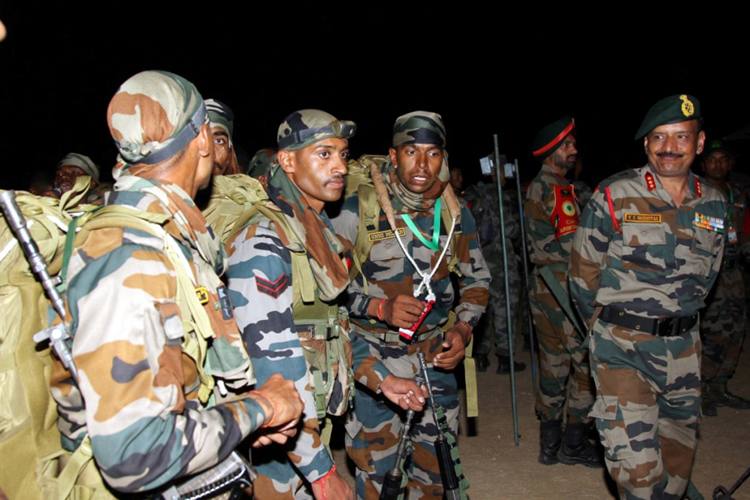INDIAN ARMED FORCES CHIEFS ON OUR RELENTLESS AND FOCUSED PUBLISHING EFFORTS

The insightful articles, inspiring narrations and analytical perspectives presented by the Editorial Team, establish an alluring connect with the reader. My compliments and best wishes to SP Guide Publications.

"Over the past 60 years, the growth of SP Guide Publications has mirrored the rising stature of Indian Navy. Its well-researched and informative magazines on Defence and Aerospace sector have served to shape an educated opinion of our military personnel, policy makers and the public alike. I wish SP's Publication team continued success, fair winds and following seas in all future endeavour!"

Since, its inception in 1964, SP Guide Publications has consistently demonstrated commitment to high-quality journalism in the aerospace and defence sectors, earning a well-deserved reputation as Asia's largest media house in this domain. I wish SP Guide Publications continued success in its pursuit of excellence.
- Indian Air Force Aims for Full Indigenous Inventory by 2047 — Air Chief Marshal A.P. Singh
- General Upendra Dwivedi takes over as the Chief of the Army Staff
- Rajnath Singh assumes charge as Defence Minister for the second consecutive term
- Admiral Dinesh K. Tripathi assumes Command of the Indian Navy as 26th Chief of the Naval Staff
- Prime Minister witnesses 'Bharat Shakti' – a Tri-Services Firing and Manoeuvre Exercise in Pokhran, Rajasthan
Indian Army HQ makes space for human rights
Facing brutal, no-holds-barred perception wars, a dedicated cell under a 2-star General will monitor rights complaints

A new Human Rights Section is at the centre of the re-organisation programme which got underway at the Indian Army Headquarters in New Delhi on August 21.
Bogged down in protracted low-intensity cross-border proxy wars waged in populated areas for over seven decades, the Indian Army is acknowledging that perception wars are just as critical - if not more important - than military dominance operations on the ground.
"To give high priority to observance of human rights convention and values, it has been decided to set up a special Human Rights Section headed by (an) Additional Director General (Major General-rank officer) directly under the Vice-Chief of Army Staff (VCOAS). It will be the nodal point to examine any HR violation reports," the Ministry of Defence declared in a statement.
The VCOAS functions as the Chief of Staff to the Army Chief, and the placement of the rights cell under him is an indication that complaints will be monitored without loss of time at the highest level.
The Army now wants to be seen as walking the extra yard on the issue of human rights also because of its insistence on the retention of the Armed Forces Special Powers Act (AFSPA), which shields soldiers from prosecution by civilian agencies for alleged misconduct. The Act allows the Army to deal with most complaints against military personnel through internal mechanisms at the level of local commanders which have sometimes been criticised for lack of transparency and objectivity
"To enhance transparency and ensure the best of investigative expertise is available to the section, a police officer of Senior Superintendent of Police/Superintendent of Police rank will be taken on deputation," the statement added, indicating systemic incorporation of external oversight into the way the Army handles human rights complaints.
The message to commanders on India's troubled battlegrounds is crystal clear: That the methods of counter-terrorism operations must be clean, and that they will be judged not just for the effectiveness of military operations but also their moral correctness.
While the Army has for long maintained that it has impartially probed complaints of rights abuse and meted punishment to its own when guilt has been proven, it has also pointed out that human rights is a toll used by forces inimical to India to put the Army on the defensive.
The Army now wants to be seen as walking the extra yard on the issue of human rights also because of its insistence on the retention of the Armed Forces Special Powers Act (AFSPA), which shields soldiers from prosecution by civilian agencies for alleged misconduct. The Act allows the Army to deal with most complaints against military personnel through internal mechanisms at the level of local commanders which have sometimes been criticised for lack of transparency and objectivity.
The setting up of the Human Rights Section overshadowed the rest of the re-structuring exercise which got underway at Army Headquarters. As part of this effort, the posts of 206 officers - including 3 Major Generals, 8 Brigadiers and 9 Colonels - have been re-located from Headquarters to field formations. This kick starts measures to make Headquarters leaner, and more officers available in the field
The setting up of the Human Rights Section overshadowed the rest of the re-structuring exercise which got underway at Army Headquarters. As part of this effort, the posts of 206 officers - including 3 Major Generals, 8 Brigadiers and 9 Colonels - have been re-located from Headquarters to field formations. This kick starts measures to make Headquarters leaner, and more officers available in the field.
Another feature of the re-structuring exercise was the setting up of a separate Vigilance Cell under the Army Chief to deal with allegations of miscellaneous misconduct including corruption by personnel. This will have tri-service participation, and be headed by a Major General. Presently, the vigilance function is exercised through multiple agencies and there is no single point interface.
"An independent vigilance cell will be made functional under COAS (Army Chief). Accordingly, ADG (Vigilance) will be placed directly under the COAS for this purpose. It will have three Colonel-level officers (one each from Indian Army, Indian Air Force and Indian Navy). This will be done within the existing posts at Army HQ," the statement added.





